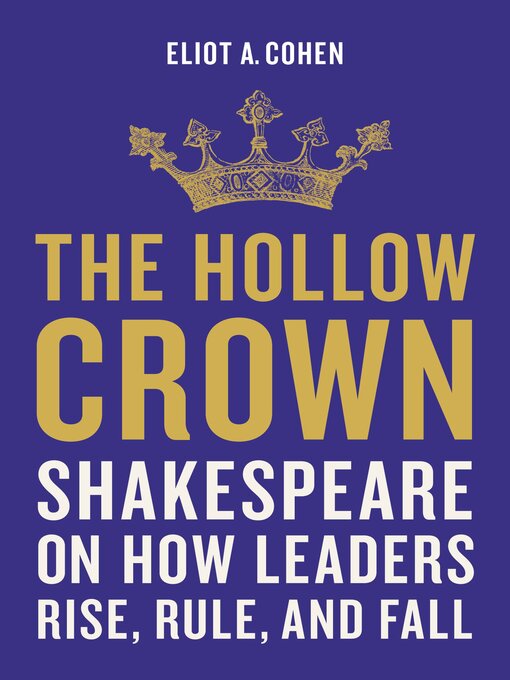William Shakespeare understood power: what it is, how it works, how it is gained, and how it is lost.
In The Hollow Crown, Eliot A. Cohen reveals how the battling princes of Henry IV and scheming senators of Julius Caesar can teach us to better understand power and politics today. The White House, after all, is a court—with intrigue and conflict rivaling those on the Globe’s stage—as is an army, a business, or a university. And each court is full of driven characters, in all their ambition, cruelty, and humanity. Henry V’s inspiring speeches reframe John F. Kennedy’s appeal, Richard III’s wantonness illuminates Vladimir Putin’s brutality, and The Tempest’s grace offers a window into the presidency of George Washington.
An original and incisive perspective, The Hollow Crown shows how Shakespeare’s works transform our understanding of the leaders who, for good or ill, make and rule our world.
-
Creators
-
Publisher
-
Release date
October 24, 2023 -
Formats
-
Kindle Book
-
OverDrive Read
- ISBN: 9781541644854
-
EPUB ebook
- ISBN: 9781541644854
- File size: 1664 KB
-
-
Languages
- English
-
Reviews
-
Kirkus
September 1, 2023
A former senior adviser at the Department of State and analyst at the Defense Department argues for Shakespeare's relevance in illuminating the workings of power. As Cohen sees it, power infuses not only political life, but also universities, foundations, institutions, and business--wherever there is a hierarchical structure. Drawing on plays including Macbeth, King Lear, and the history plays from Richard II to Richard III, Cohen examines the arc of power: ways power is acquired, how it is exercised, and how it is lost. "Inherited power is the norm and is always perilous," as Shakespeare shows, since the heir to power may be unequal to its demands. "Cunning and calculation and adroit maneuvering" is another path to power, as is seizure, which leaves the usurper fearful of rivals to a crown or a presidency. Cohen cites Julius Caesar and Macbeth as unhappy examples of the lust for power through seizure. Conspirators, Shakespeare shows, cannot succeed alone, but "must have a willing or at least a complacent victim." Often, they ignore the consequences of their actions until it is too late. Cohen explores the exercise of power through inspiration (Churchill, JFK, Henry V), manipulation (Lincoln, FDR, Henry V once again), and murder, metaphorical--when a head is forced out--or bloody (Lenin, Stalin, Macbeth, Richard III). Innocence about the world, along with arrogance and complacency, combine to cause loss of power, which Cohen sees exemplified in the Henry VI plays, where a king is shown as out of touch with his country's needs. In modern times, he ascribes the fall of Margaret Thatcher to the same forces. Sometimes, however, power is relinquished--with regret, or with dignity. For Cohen, Shakespeare underscores the connection of power to magic, theater, and charisma. "The exercise of power," he writes, "is facilitated by trappings designed to impose awe." A thoughtful consideration of the complexities of power.COPYRIGHT(2023) Kirkus Reviews, ALL RIGHTS RESERVED.
-
Formats
- Kindle Book
- OverDrive Read
- EPUB ebook
subjects
Languages
- English
Loading
Why is availability limited?
×Availability can change throughout the month based on the library's budget. You can still place a hold on the title, and your hold will be automatically filled as soon as the title is available again.
The Kindle Book format for this title is not supported on:
×Read-along ebook
×The OverDrive Read format of this ebook has professional narration that plays while you read in your browser. Learn more here.

